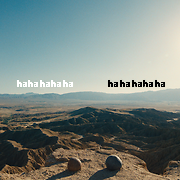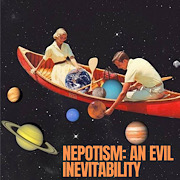|
mawarannahr posted:what slips through the cracks in terms of what can be expressed by words and what canít? your post reminded me of research into how Google Maps is ruining our brains Oh that's a really interesting point, I hadn't thought about things like actual cognitive processes being farmed out to technology like that. Especially given that it seems to degrade not just the kind of bigger-scale navigation that GPS is mostly used for, but also makes people worse at navigating smaller spaces like the mazes in the study. I guess to some extent that's just the tradeoff that comes with using any technology though, the more we depend on tools to do things the worse we get at doing them ourselves. That does lend credence to Socrates's point in a broad sense, in that we have to consider that our tools can wind up reducing our own capacities. I wonder if the same type of thing happens with the writing-as-external-memory phenomenon, I wouldn't be surprised if relying on books/google/wikipedia/etc for recalling fine details degrades our ability to remember them but idk if that's a particular type of memory versus broader concepts. My intuition is that it is, given that smoking a lot of weed has made me very bad at remembering those details lmao, but also that might just be that my memory in general is worse and it's a lot more noticeable with those kinds of specifics.
|
|
|
|

|
| # ? Jun 10, 2024 13:15 |
|
The Druids had a moratorium on writing and look what happened to them, now their religion is solely practiced by over literate nerds
|
|
|
|
Eldoop posted:Oh that's a really interesting point, I hadn't thought about things like actual cognitive processes being farmed out to technology like that. Especially given that it seems to degrade not just the kind of bigger-scale navigation that GPS is mostly used for, but also makes people worse at navigating smaller spaces like the mazes in the study. I guess to some extent that's just the tradeoff that comes with using any technology though, the more we depend on tools to do things the worse we get at doing them ourselves. That does lend credence to Socrates's point in a broad sense, in that we have to consider that our tools can wind up reducing our own capacities. I wonder if the same type of thing happens with the writing-as-external-memory phenomenon, I wouldn't be surprised if relying on books/google/wikipedia/etc for recalling fine details degrades our ability to remember them but idk if that's a particular type of memory versus broader concepts. My intuition is that it is, given that smoking a lot of weed has made me very bad at remembering those details lmao, but also that might just be that my memory in general is worse and it's a lot more noticeable with those kinds of specifics. This is also an interesting thing to think about because it isn't one-way degradation. Using a smartphone GPS to navigate, for example, may make you worse at navigating without a smartphone GPS, but it makes you better at navigating with one. If you go to a completely new and unfamiliar place, someone with no smartphone GPS but great spatial memory will be pretty hopeless because they have no memory to draw on, but somebody with a smartphone GPS can find their way around by using their skill at GPS navigation. You can draw similar parallels to Socrates's (or Plato's) argument about reading versus relying on conversations and memory. Sure, relying on reading written texts might alter the way you encode memories of complex information because your brain gets used to the idea that it can look things up when you need to know them instead of remembering them on the spot. Conversely, you are at the same time building new and different skills like remembering where you previously read a piece of information, or deepening your ability to do research on a topic in order to answer a question, or learning how to read a new text on an unfamiliar subject to learn something you previously didn't know. Socrates complains, for example, that you can't engage a written text in Socratic dialogue to learn more about it, you have to just take or leave what it gives you. Sure, that's not wrong. But it's also overlooking the obvious advantages of that model, like for example being able to build a library of different texts and use them to learn about a variety of subjects, which for most people is not ever going to be possible through just talking to people you know in real life. By building and using a library like that, you're developing new skills and new ways of remembering things. Like for example I have read many books but don't remember the details from all of them, but I often remember that a detail exists in a certain book, and roughly where I found it, which makes it easy to look up that detail when I need to recall it for some reason. My memory is likely not any worse because I'm learning a lot of things from texts rather than through conversations, even if my brain has adapted to this different model of knowledge by developing different skills to engage with my memories. It's like, a skilled carpenter could make the argument that the invention of the chainsaw has degraded people's ability to saw down trees by hand. They're correct! But that's also besides the point because people have adapted to the new technology to do things in a different and often more efficient way.
|
|
|
|
Eldoop posted:Oh that's a really interesting point, I hadn't thought about things like actual cognitive processes being farmed out to technology like that. Especially given that it seems to degrade not just the kind of bigger-scale navigation that GPS is mostly used for, but also makes people worse at navigating smaller spaces like the mazes in the study. I guess to some extent that's just the tradeoff that comes with using any technology though, the more we depend on tools to do things the worse we get at doing them ourselves. That does lend credence to Socrates's point in a broad sense, in that we have to consider that our tools can wind up reducing our own capacities. I wonder if the same type of thing happens with the writing-as-external-memory phenomenon, I wouldn't be surprised if relying on books/google/wikipedia/etc for recalling fine details degrades our ability to remember them but idk if that's a particular type of memory versus broader concepts. My intuition is that it is, given that smoking a lot of weed has made me very bad at remembering those details lmao, but also that might just be that my memory in general is worse and it's a lot more noticeable with those kinds of specifics. That reminds me of The Charles Stross novel Accelerando https://en.wikipedia.org/wiki/Accelerando which has a chapter about this, where in the future a guy who has gone to an extreme with this and has ports to connect his brain to smart glasses and all a mesh computing thing on his head, etc. gets mugged and all his stuff taken and he's totally unable to function at first and it takes him hours to be able to do much of anything because he's been so reliant on a lot of his thinking being outsourced to the computers he was using without really realizing how reliant on them he had become.
|
|
|
|
Sherbert Hoover posted:compensating for something? Can't a guy just really like garlic?
|
|
|
ArmZ posted:there is as much historical evidence for the existence of socrates as for the existence of jesus Well, that's certainly good news for the historical evidence for the existence of Jesus.
|
|
|
|
|
https://twitter.com/lawrence_wright/status/1569127019895455744
|
|
|
|
It's also like the 3rd Plymouth Rock because tourists kept chipping off a piece of it, then when they replaced it with another rock, the tourists went to town on that one too. Now they have it like that because the third meaningless rock must be protected.
|
|
|
|
|
Azathoth posted:It's also like the 3rd Plymouth Rock because tourists kept chipping off a piece of it, then when they replaced it with another rock, the tourists went to town on that one too. Now they have it like that because the third meaningless rock must be protected. Its the same rock, just much smaller than it was originally
|
|
|
|
It's hard to overstate how much personal restraint it's taking me to not belittle this imbecile for posting Early Modern history in the Pre-Modern thread
|
|
|
|
the cutoff is napoleon but not gonna lie i initially posted in the wrong thread for that reason lol ive given up on just the one history thread idea but could the mods maybe move the dividing line from napoleon to first contact with the americas thats probably a better spot
|
|
|
|
1492 sometimes seems like a clean cut because it's both first contact as well as the conquest of granada and the completion of the reconquista. the inquisition had just begun though and that was pre-modern as hell
|
|
|
|
i say swears online posted:the inquisition had just begun though and that was pre-modern as hell was it really
|
|
|
|
yes
|
|
|
|
how about we just deliberately leave that issue unresolved so that nobody expects the spanish inquisition
|
|
|
|
I think 1453 is a good time
|
|
|
i say swears online posted:1492 sometimes seems like a clean cut because it's both first contact as well as the conquest of granada and the completion of the reconquista. the inquisition had just begun though and that was pre-modern as hell the inquisition is a thoroughly early-modern institution lol, the middle ages were relatively relaxed about that kind of thing unless the pope got all heated up about something but i do think that early-modern discussion generally fits better into a thread with all of the pre-1492 stuff than it does with post-1848 history Jazerus has issued a correction as of 03:43 on Sep 13, 2022 |
|
|
|
|
the counter-reformation seems more pre-modern but the reconquista/inquisition remind me more of the crusades than the 30 years' war. when i took a modern western civ course in college their beginning was the peace of westphalia
|
|
|
|
Barry Foster posted:Johnny Three Dices
|
|
|
|
THAT'S Plymouth Rock?? gently caress this cornball rear end nation
|
|
|
|
lmfao/https://tf-cmsv2-smithsonianmag-media.s3.amazonaws.com/filer/72/79/7279ae74-d094-4db1-befb-d3900e684d7d/nmah-rws2012-04276.jpg)
|
|
|
|
i say swears online posted:the counter-reformation seems more pre-modern but the reconquista/inquisition remind me more of the crusades than the 30 years' war. when i took a modern western civ course in college their beginning was the peace of westphalia that's a very common dividing line for Eurocentric college courses
|
|
|
|
the dividing line is pre/post American revolution.
|
|
|
|
People could just go by their own definitions of modern and premodern since most people interested will be reading both threads anyway. For example I draw the line at the accession of Fredrick III of Denmark in 1536 in accordance with the current Norwegian history textbook.
|
|
|
|
it's silly it doesn't matter the primary function of the divide is literally to keep the romechat out of the ww2 chat and vice versa and that's it. otherwise those two subjects tend to suck all the oxygen out of the room and make history topics largely about one or the other. in cspam we also occasionally wanna argue about marxism so there's a third thread that also occasionally acts as a history thread for the same reason.
|
|
|
|
CoolCab posted:it's silly it doesn't matter the primary function of the divide is literally to keep the romechat out of the ww2 chat and vice versa and that's it. otherwise those two subjects tend to suck all the oxygen out of the room and make history topics largely about one or the other. in cspam we also occasionally wanna argue about marxism so there's a third thread that also occasionally acts as a history thread for the same reason. yeah this, I don't think anybody really cares where the dividing line is drawn as long as ancient Rome and Stalin aren't sharing a thread
|
|
|
|
CoolCab posted:it's silly it doesn't matter the primary function of the divide is literally to keep the romechat out of the ww2 chat and vice versa and that's it. otherwise those two subjects tend to suck all the oxygen out of the room and make history topics largely about one or the other. in cspam we also occasionally wanna argue about marxism so there's a third thread that also occasionally acts as a history thread for the same reason. This is correct. When twoday and I had originally discussed breaking this into two threads, the idea was essentially to make Roman etc. chat separate from more traditional cspam topics. We'd decided on Waterloo because, although just as arbitrary as any other of the good suggestions made itt, it keeps things like Marxism, early 19th century capitalism, and the ideologies and consciousness that arose from 1848 together with the resulting 150 years, which I think are tied together a bit more tightly than the centuries prior. Of course, we never had any intention of making that a definite line that people shouldn't cross if the conversation flowed that way from its origin.
|
|
|
|
A Buttery Pastry posted:Only one of them ended up having a huge meltdown in the Forum. also lol
|
|
|
|
this rock STINKS!
|
|
|
|
mawarannahr posted:I think 1453 is a good time the transition from the late middle ages began in 1453 and was completed in 1492. the intervening years are what the kids these days are calling a liminal space (i donít know what this means)
|
|
|
|
fabergay egg posted:the transition from the late middle ages began in 1453 and was completed in 1492. the intervening years are what the kids these days are calling a liminal space (i donít know what this means) It means a space that makes you do this 
|
|
|
|
fabergay egg posted:the transition from the late middle ages began in 1453 and was completed in 1492. the intervening years are what the kids these days are calling a liminal space (i donít know what this means) its when you are walking to the coffee shop sunday morning at 7 am and it's still not open for some loving reason
|
|
|
|
fabergay egg posted:the transition from the late middle ages began in 1453 and was completed in 1492. the intervening years are what the kids these days are calling a liminal space (i don’t know what this means) It means a place you just pass through, like a hotel room or airport. You don't "belong" there like at home, or a friend's house, or at work.
|
|
|
|
Well I don't belong anywhere except now so all past is liminal.
|
|
|
|
severance but it's about inquisition torturers
|
|
|
|
Grevling posted:People could just go by their own definitions of modern and premodern since most people interested will be reading both threads anyway. For example I draw the line at the accession of Fredrick III of Denmark in 1536 in accordance with the current Norwegian history textbook.
|
|
|
|
[Pre-modern history] about the fun history, before Frederick III of Denmark ruined everything
|
|
|
|
Why did the protestant reformation happened in Germany? One would think that tithes, indulgences and problematicness of saints and purgatory would have been seen as problems in catholic faith all over christian world.
|
|
|
|
Fish of hemp posted:Why did the protestant reformation happened in Germany? One would think that tithes, indulgences and problematicness of saints and purgatory would have been seen as problems in catholic faith all over christian world. The Germans didnít want to pay for extravagant Mediterraneans to sit around and eat all day.
|
|
|
|

|
| # ? Jun 10, 2024 13:15 |
|
It took a while for Northern Europe to develop to the point where there was a real cultural rivalry with the Mediterranean rather than dependency, and its representation in the Catholic Church hadn't caught up to the position they felt they deserved.
|
|
|




































